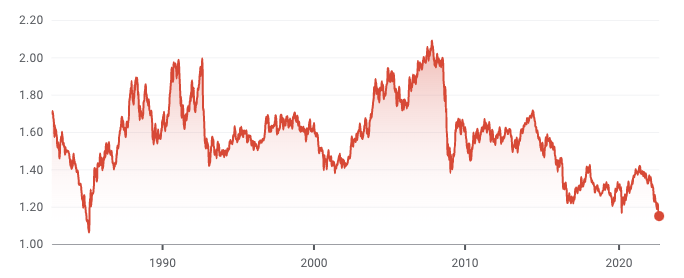Things are going from bad to worse in Britain — and at a rapid clip. With the pound falling to its weakest level since 1985, there is talk of a looming currency crisis in Britain. In this scenario, the value of sterling would fall and living standards would follow suit. Currency crises are rare in stable, developed countries and more typically associated with economic basket cases like Argentina and Venezuela. So what is happening?
Discussions surrounding a potential currency crisis started earlier this week when respected Deutsche Bank analyst Shreyas Gopal published a note on the British election. In the letter, Gopal pointed to the fact that, due to inflation and rising energy costs Britain’s current account deficit — that is, the amount of money the country is borrowing from the rest of the world — could hit 10% soon. Current account deficits of 2-4% are standard fare for Britain, but a deficit of 10% would put the country in an extremely precarious position.
Gopal notes that the only reason that Britain has been able to finance this deficit until now is because of “large capital inflows”. This is money sent from other countries into the UK — mostly into the City of London and the London property market — which foreigners believe will yield a good investment return. He adds that this money is being sent because investors believe in “improving investor confidence and falling inflation”.
Yet with the fundamentals deteriorating so rapidly, the analyst highlights the possibility of “investor confidence [eroding] further” and that “this dynamic could become a self-fulfilling balance of payments crisis whereby foreigners would refuse to fund the UK external deficit”. This would mean a decline in the value of sterling of at least 30%.
This is the nightmare scenario that those who worry about the stability of the British economy have been concerned about for some time. Many have noted that sterling responds rapidly to events such as Brexit. Most currencies do not behave in such a volatile way toward referenda and other one-off events. But because sterling’s value depends on financial inflows, its value can change drastically overnight.
What would a true collapse of sterling mean for Britain? Frankly put, it would mean a drastic decline in living standards. Britain is an island nation. It imports large amounts of what it consumes. Imports make up around 32% of GDP in the UK which is enormous when compared with the United States (13%) or even Australia (21%). If the sterling falls by, say, 30%, then the price of these imports rises by 30%. As such, around one-third of the products that Britons buy will immediately increase in price by around 30%.
Then there are the pass-through effects. If something is produced in Britain but uses a large amount of imported inputs to make, this good will rise in price too as the inputs rise in price. In an economy with the import-dependency of the UK, a crash in the currency value would have a detrimental impact on living standards that are not easily reversed. If this were to happen, Britain would be in serious trouble.
Historians may look back on this moment in history and note that Britain, a country that was a leading champion of the sanctions against Russia in 2022, turned out to be their worst victim. Let us hope that cooler heads prevail and we choose a different path.











Join the discussion
Join like minded readers that support our journalism by becoming a paid subscriber
To join the discussion in the comments, become a paid subscriber.
Join like minded readers that support our journalism, read unlimited articles and enjoy other subscriber-only benefits.
Subscribe